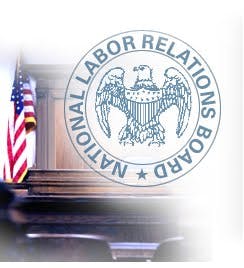I joined my fellow Florida HR People & Strategy members this week at a session on current news about the National Labor Relations Board, and how they may view employee policies.
This is not exactly my topic, but I like talking with the other members so I dragged myself out in the early morning for the presentation.
Attorney Juan Lopez-Campillo, from the law firm Jackson Lewis here in Orlando, was the presenter and for about an hour, most of us in the room sat with our chins on the floor as he went through example after example of how the NLRB can take an employee policy and twist it so that it “tends to chill employees from engaging in concerted and protected activity.” That is, it appears to inhibit employees complaining about their work environment to each other, the act of which is protected under Section 7 of the National Labor Relations Act.
The NLRB and you handbook policy statements
Mr. Lopez-Campillo was a fabulous presenter and his examples were “real world” and practical. But almost every one of the policy statements that he identified as unlawful (according to the NLRB) are found in most every company’s employee handbook. That’s why we all had our chins on the floor.
For an hour I sat there thinking, “OMG – we’re doomed as employers.” Not only do our managers need to remember the ADA, the FLSA, the FMLA, Title VII, and on and on, but now we’re adding yet another “don’t do this” to the list of what managers have to consider. And we, as HR, now have to go through our policies and amend any language that appears to inhibit employees from talking with each other about the work environment.
And of course, to make matters more frightening, Mr. Lopez-Campillo described the recent completion of the five member National Labor Relations Board, showing a three-member majority supporting labor, and the minority supporting business. New energy, new focus and this group could REALLY cause some furor.
He then reminded us that Section 7 covers all employers, whether under a collective bargaining agreement or not.
A smart strategy: Be fair, listen to employees
And then,as a closing remark, he brightened my day!
He said that if employers focus on treating employees fairly and consistently, on listening to employees and being responsive, there is really no reason for organizers to come knocking on our doors. Okay then – that I get. Let’s make sure our leaders are effective leaders, and the rest should fall into place.
Could it really be that simple? No, probably not quite that simple. Leaders do need to have an awareness of the consequences of collective bargaining, and the impact on the business and leadership role. Perhaps a “class” is a good way to convey this important information.
Or perhaps this is a strategic coaching opportunity for HR. Take a leader to lunch or have a monthly meeting where, in a very short time, you share a story about how things work in a collective bargaining shop and how that would impact your business and remind them of the importance of talking with their employees on a regular basis. Perhaps even give them a couple good questions to start a dialogue with employees. A tangential benefit is building the relationship with the leader.
What do you think? Rather than teaching labor law, should we concentrate on coaching leadership skills?
This originally appeared on the ….@ the intersection of learning & performance blog.
